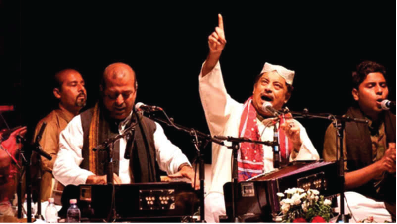
Article by
Qawwali is used as a rich spiritual metaphor. An article written by Markoff named” Sufi Music of India and Pakistan: Sound, Context and Meaning in Qawwali” explores the aesthetics of Qawwali lyrics He terms it as a wine which has an intoxicating impact on the listeners. Furthermore he postulates that this wine has been brought from Medinah because Muslim community has a deep association with Medinah as it has a special significance for them. He further argues that it was just a massive venture that the poetry/lyrics began to reach new heights of performance. They started performing Concerts - both live and radio - and movies and their music became widespread through recordings. Transforming the secret of Sufi monasteries and shrines in public circles led to the emergence of the style of popular poetry featuring separate conventions on music and song content. Popular poetry has lost its usefulness as a transformational meditation technique and while maintaining religion, they also acquired the qualities of entertainment.
The impact of lyrics on the audience takes them in a trance-like state but it varies from individual to individual. The impact of wine is metaphoric which in other words conveys metaphoric and implied meaning in religious context. The message disseminated in the Qawwali lyrics is conveyed through implicature. This is the key distinction between the general sense of wine intoxication and the intoxication implied in Qawwali lyrics.
Mushtaq Ali in his article “Sacred Status of Qawwali in Chishtia Order : A Case Study of the Shrine of Mehr Ali Shah” postulates that Qawwali is a catalyst for spiritual happiness, and even a culturally diverse audience is spiritually inspired by its comprehensive Islamic appeal and content. He analyzed the contents of Samma conducted at the Shrine of Mehr Ali Shah (a Chishtia saint) in order to read the complex configuration of the genre of Qawwali. The function of Qawwali music, according to its place in the ideology of Sufism, is to serve the offerings of Sufi poetry, awaken mystical sentiments in a gathering of listeners with spiritual needs which are both diverse and changeable. The characteristics of the three main components of this function are: 1) Encouragement, 2) Text usage, 3) Diverse Listeners. Based on these results, it becomes possible to interpret the process of performing a particular Qawwali event and, on this basis, decode the current musical message as the meaning of its social context; how the performer uses his musical language in the performance, what he says, and why he says that. Qawwali influences the audience through the presentation of its composers and the expense of language and accent. Listeners consider themselves to be in the past and to the coming divine. Music helps to keep the memory of the audience members and the ability to recall specific episodes of the past as sacred or desecrated. Qawwali music is an important medium where the listener mediates between experience and remembering the past.
Bulleh Shah and Shah Abdul Latif’s Sufi Poetry and their poems written in the late eighteenth century criticize the growing wave of Mughal corruption and nepotism, religious Intolerance, suffering of ordinary people and hard thinking. Their poetry puts them in risky positions against the scholars “ulema” and politics of the royal Mughal court. Sufi Kalam (poetry) has historically been an expression of resistance to those scholars and especially those who allied themselves with the Establishment. They claim that Sufi poetry expresses spiritual aspirations. It was also written and sung as a political protest against oppression and religious chauvinism. Modern day singers like Abida Parveen and Nusrat Fateh Ali Khan deliberately chose the poetry of Bulleh Shah and Shah Abdul Latif during the dictatorial rule of General Zia-ul-Haq and the rise of intolerance in Pakistan’s Islamist groups. Qawwali is open to innovation, refinement and adaptation. Putting music together traditional and modern, Qawwali is one of the main tasks in its training and practice.
Qawwali also comes before us as a very good catharsis because it is a transcultural genre of music, so it is freed from the confinement of color, caste and religion and stirs the internal emotions of the audience through its universal expressions. Diversity within creates harmony among individuals, positivity and fraternity in the society. All sorts of people come there to seek their wishes and to strengthen their connection with nature and the creator of nature, due to the gatherings of sama at the courts of Sufi sages.
 Monthly "Azeem English Magazine", launched in 2000, records the information about diverse fields like mental health, literature, research, science, and art. The magazine's objective is to impart social, cultural, and literary values to society.
Monthly "Azeem English Magazine", launched in 2000, records the information about diverse fields like mental health, literature, research, science, and art. The magazine's objective is to impart social, cultural, and literary values to society.
+92 51 88 93 092
First Floor, RAS Arcade, Eidhi Market, Street#124, G-13/4, Islamabad, Pakistan, 44000.